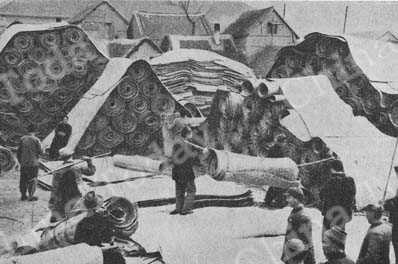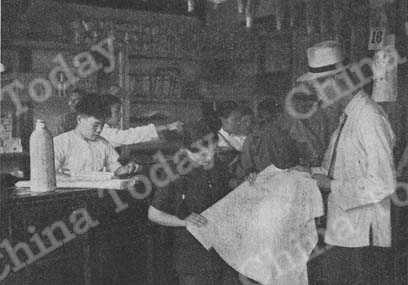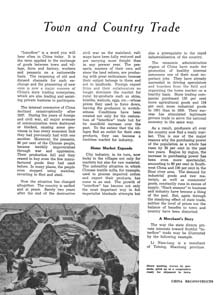"Interflow" is a word you will hear often in China today. It is the term applied to the exchange of goods between town and village, farm and factory, workers and peasants on a nationwide basis. The reopening of old and disused channels for such exchange and the pioneering of new ones is now a major concern of China's state trading enterprises, which are also leading and assisting private business to participate.
The internal commerce of China declined catastrophically after 1937. During the years of foreign and civil war, all major avenues of communication were destroyed or blocked, causing some provinces to lose every economic link they had previously had with one another. Moreover, the peasants, 80 per cent of the Chinese people, became terribly impoverished through war and oppression. Their production fell and they ceased to buy even the few manufactured goods they had used before. In many places, the people even stopped using matches, reverting to flint and steel.
Now the situation has changed altogether. The country is unified and at peace. Barely two years after the end of the destructive civil war on the mainland, railways have been fully restored and are carrying more freight than in any prewar year. The peasants, masters of their own soil since the land reform, are producing with great enthusiasm because their output belongs to them and not to landlords. Foreign export firms and their collaborators no longer dominate the market for rural by-products such as skins, bristles, walnuts, eggs, etc. - whose prices they used to force down, leaving the producers in wretchedness. Conditions have been created not only for the restoration of "interflow" trade but for its manifold increase over the past. To the extent that the villages find an outlet for their own products, they can become a limitless market for industry.

Straw matting, woven by peasants, piled up at a cooperative ready for shipment to town.
Home Market Expands
City industry, in its turn, now looks to the villages not only for markets but also for raw material. The unhealthy situation in which Chinese textile mills, for example, used to process imported cotton and export their products, has come to an end. The growth of "interflow" has become not only the most important way to foil imperialist blockade attempts but also a prerequisite to the rapid industrialization of the country.
The economic administration organs of China have made the promotion of healthy internal commerce one of their most important jobs. They have already succeeded in driving speculators and hoarders from the field and organizing the home market on a healthy basis. State trading companies purchased 130 per cent more agricultural goods and 154 per cent more industrial goods in 1951 than in 1950. Their success has stimulated legitimate private trade to serve the national economy in the same way.
As a result, producers all over the country now find a ready market. This is one of the major reasons why the purchasing power of the population as a whole has risen by 30 per cent in the past two years. Region by region, the increase in purchasing power has been even more spectacular, amounting to 60 per cent in Southwest China and 100 per cent in the Huai river area. The demand for industrial goods and raw materials, as well as consumers' goods, constantly runs in excess of supply. "Slack seasons" in business and industry have become a thing of the past. But, again through the steadying effect of state trade, neither the level of prices nor the balance of benefits to town and country have been disturbed.
A Merchant's Story
The way the state directs private interests toward fruitful "interflow" trade may be illustrated by the following example.
Li Nien-tung is a merchant of Tsining, Shantung province. Starting with a capital of ¥30,000,-000 People's Currency (US$1,500 or £535), he did ¥2 billion (US $100,000 or £35,700) worth of "interflow" business in ten months.
A man of 22 years' commercial experience, Li had engaged in inter-provincial trade once before. The anti-Japanese and civil wars, however, changed him into a retail shopkeeper. After the liberation, he was encouraged to put his old knowledge to use once more by repeated urgings from the authorities and by the credits offered by government banks and transport concerns.
Li began by resuming his business connections with other cities and setting up new ones. When visiting Tsinan, capital of Shantung, he met a merchant from Tientsin and learned that Tientsin people loved to eat black melon seeds from the Shantung countryside. In Tientsin, he found people lining up for diesel oil of which there happened to be considerable stocks in Canton. In Hunan, he found plenty of tung oil which was badly needed by Shantung fishermen for their boats. In Wusih he found vegetable oil factories short of soybeans, which were a drug on the market in his home town, each October.
Within a few months, Li Nien-tung's trade network spread over 12 cities in all parts of the country. He kept up a large correspondence and sent salesmen out with samples. Last spring he organized a combine of 15 firms dealing in sea food. His success brought him not only profit but also honour. The Bureau of Industry and Commerce in his native town of Tsining cited him as an example of the kind of man "who can bring benefit both to himself and to the Chinese people."
That Li Nien-tung and hundreds like him have done well in internal trade is of course no accident. With the carrying out of the land reform in most parts of China, the peasants have been working hard and busily - because they are working for themselves. An estimate made by the Committee on Financial and Economic Affairs of the Central People's Government shows that the by-products our peasants produce for sale each year, over and above their main crops, amount to over ¥40 trillion (US $2 billion) a year. Government trading companies, cooperatives and private businessmen are all coming into the market for these, and are bringing industrial products from the cities to encourage the peasants to turn them into cash. Peasant purchasing power is zooming. In some parts of the country, such as the Northeast, it went up fivefold in a single year.

A peasant woman buys cloth at a well-stocked local co-op.
Rediscovering China's Wealth
To promote the interflow of goods between town and village, Native Products Exhibitions have been held in key cities all over the country. Peasant producers from hundreds of miles away were able to send their goods there through their new co-operative marketing groups. Visitors came in millions, and enormous transactions were closed.
Nomads were helped by the government to come all the way from Sinkiang to see the exhibition in Shanghai and to order tea, silk and manufactured goods.
Businessmen who had lived along the coast all their lives were stimulated by things they heard and saw to travel thousands of miles into the interior, where they ordered furs, leather, sheepskins, herbs, tung oil, chemicals and raw materials for industry.
The results are already evident in the appearance of southern bamboo manufactures as household articles in North China, and of tropical fruits in large quantities on the markets of Peking, Tientsin and the cities of the Northeast.
Merchants and industrialists, especially, found that they had had no idea previously of the riches of their own country. Living in the coastal ports which imperialism had tied to its own economy, they had formed the mental habit of relying on imported goods for existence, and had really come to believe that China was poor in natural resources. One former importer exclaimed after returning to the north from an exhibition in Shanghai: "I had the shock of my life. Here I'd been importing expensive cork from abroad when we have tons of it, good and cheap, in our Shensi province."
This businessman is typical of many who used to consider the wide oceans no barrier while they had no idea of what materials could be found a few hundred miles inland. Now these men will start looking inside China for what they need. And they will find it, because the resources of our country are limitless.


 Copy Reference
Copy Reference 